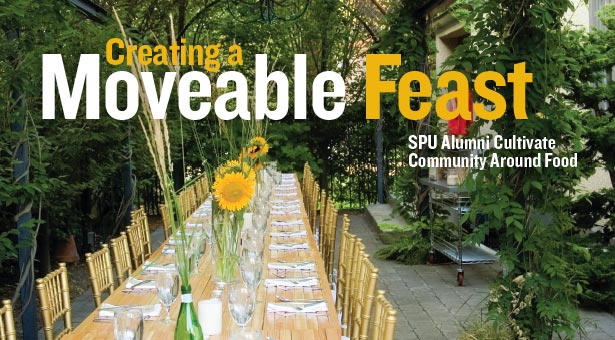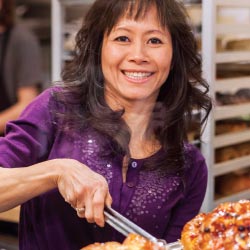 The table is set for a dinner hosted by Big Table, a ministry to chefs and restaurant workers founded by Kevin Finch ’89. Dinners feature gourmet offerings by Spokane-area chefs such as guajillo chile grilled rack of lamb. Photo courtesy of Kevin Finch.
The table is set for a dinner hosted by Big Table, a ministry to chefs and restaurant workers founded by Kevin Finch ’89. Dinners feature gourmet offerings by Spokane-area chefs such as guajillo chile grilled rack of lamb. Photo courtesy of Kevin Finch.
By Clint Kelly (ckelly@spu.edu)
To engage the culture and make a difference in her community, fashion design graduate Andrea Napenas Nakata ’87 found she had only to look around her. She saw the Queen Anne neighborhood in Seattle where she lived: the retirees, young families, friends, and neighbors. What if she created a warm, inviting place for them to gather and connect?
Other Seattle Pacific University alumni have asked a similar question in the places where they live. Their answers are creatively diverse, yet all involve shared meals around a united table.
In Nakata’s case, that table is a door. The glass-topped antique door for eight sits at the center of her neighborhood bakery. It perhaps best symbolizes how she provides comfort and a sense of community, fueled by some of the best French pastries west of the river Seine.
Le Rêve, “The Dream,” took flight two years ago. “I’ve always been a foodie,” says Nakata, a mother of four. “This is my niche.” She and the Le Rêve team fashion mouthwatering desserts from an alchemy of butter, flour, cream, and sugar. One neighborhood patron calls Le Rêve “a fancy spa for your mouth.”
 Andrea Nakata ’87, owner of Le Rêve Bakery, offers a mouthwatering variety of French pastries at her community gathering place. Photo by Luke Rutan.
Andrea Nakata ’87, owner of Le Rêve Bakery, offers a mouthwatering variety of French pastries at her community gathering place. Photo by Luke Rutan.![]() View more photos
View more photos
More than that, it is an inviting gathering place. Local schools and Ghanaian orphans benefit from the artistry and profits of Le Rêve. Above the bakery, a meeting room hosts a French conversation group and a men's book club.
Just east a few blocks from Le Rêve, at George and Claire Scranton’s home, “family” meals welcome six to 14 people for a typical Sunday dinner, and 35–80 people for holidays and special commemorations.
George ’69, an SPU professor of theatre for 43 years, says that he and Claire ’68 consider setting a table and cooking for others “an act of love.”
“We form a spiritual family around the table,” says George, for whom everyday meals share some of the meaning of the Eucharistic table. “It is in those finite elements and in the thanksgiving we offer together that we admit we are in need of God’s blessing to live.”
To that, Kevin Finch ’89 would add a hearty amen. Since 2009, he and a burgeoning team of volunteers have been inviting food-service workers to “Big Table,” hearty gourmet meals served free-of-charge to under-appreciated and overworked restaurant and hospitality workers in Spokane, Washington.
“These gifted and generous people suffer low pay and massive stress,” says former church pastor Finch. “I couldn’t find one nonprofit organization in the country devoted to these millions of workers, yet there are thousands of agencies dedicated to helping dogs and cats.”
So he became a pastor to the food industry, inspired by the Acts 2 description of the early church’s common meals and care for one another's needs.
Big Table is a safety net woven from a chain of volunteers that includes top restaurant chefs in the Spokane region and ordinary citizens willing to help. Last year, Big Table threw five dinners, hosting 46 food industry workers on average. In between Big Table dinners, volunteers follow up on prayer requests and meet specific requests.
“We enlist people to be friends and mentors to those in distress,” says Finch. “People who hurt don’t want a program; they want a relationship.”
Audrey Hazel Williams ’12 and Connor Williams ’12 of Vancouver, Washington, decided to try the “food stamp challenge” to better empathize with those who struggle to afford meals.
For a week, they lived on the $4 per person per day that the federal government allots for people living on food stamps. Audrey, the AmeriCorps nutrition education leader at the Clark County Food Bank, says it was difficult to eat nutritiously on so limited a budget. The “food insecure,” they found, need help in making that money stretch.
“Food is an extremely personal thing,” says Audrey. “I felt self-conscious sharing photos of my meals on the food bank blog so people following the challenge could get a sense for types of affordable food.”
The food bank's cooking classes in which community members teach low-income individuals and families how to eat healthy have one strict rule: At the end of class, everyone — teachers, volunteers, and participants — must gather at the table to enjoy the food they prepared.
Audrey says it works. “Sharing food bonds people to one another. They find common ground where it didn’t exist before.” She takes satisfaction from teaching the skills required to make food stamp benefits work. “At SPU,” she says, “I was shown the importance of being compassionate and understanding.”
